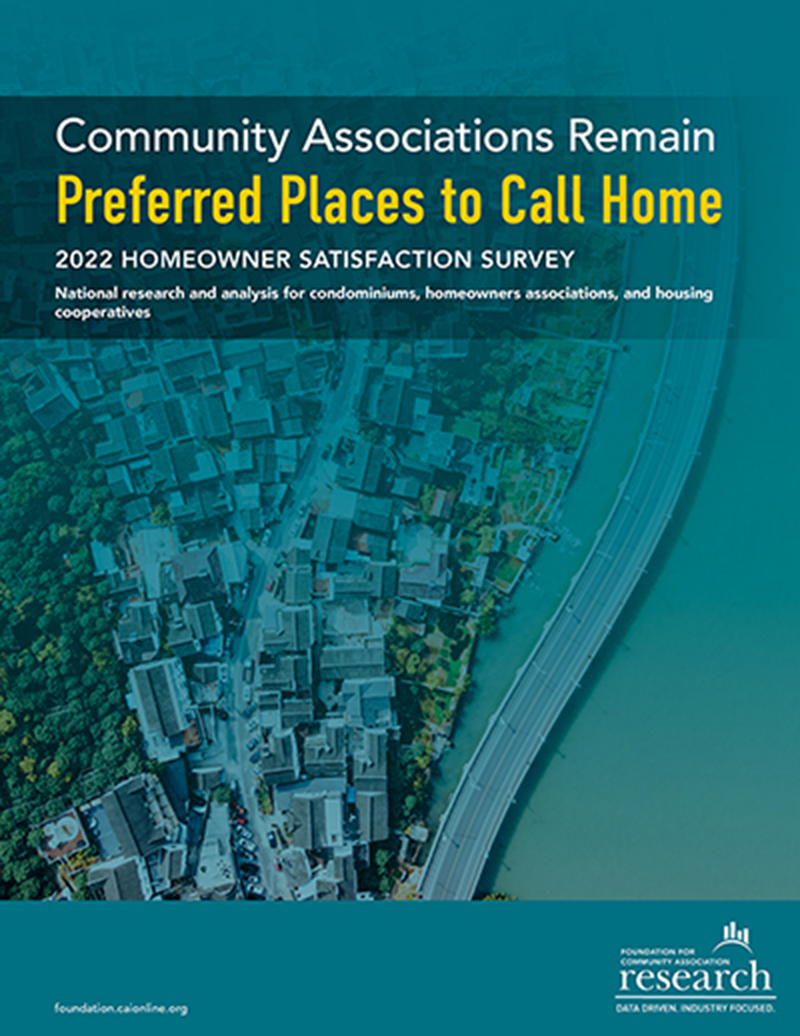
Condominiums and homeowners associations remain popular choices for U.S. homeowners
 Maintenance-free, safety, and cleanliness are top features that make community associations a popular choice and lifestyle for millions of Americans. According to results from the 2022 Homeowner Satisfaction Survey, the overwhelming majority (89%) of homeowners and condominium association residents rate their overall experience of living in a community association as “very good” or “good” (67%), or neutral (22%).
Maintenance-free, safety, and cleanliness are top features that make community associations a popular choice and lifestyle for millions of Americans. According to results from the 2022 Homeowner Satisfaction Survey, the overwhelming majority (89%) of homeowners and condominium association residents rate their overall experience of living in a community association as “very good” or “good” (67%), or neutral (22%).
The new report, conducted by the Foundation for Community Association Research (FCAR) for Community Associations Institute (CAI), is a biennial, nationwide survey administered by independent researcher Zogby Analytics, and provides a better understanding of how 74 million Americans describe their experience living in common-interest communities— from city-sized, master-planned communities and multi-building condominium complexes to urban cooperatives and small homeowners associations built into tracks of open suburban spaces.
At a time when community matters most, the majority (87%) said they knew their home was part of a community association and nearly half (45%) said the association made them more interested in the home. 87% of respondents believe that their governing board “absolutely” or “for the most part” serves the best interest of the community. More than half of residents (68%) believe that rules in their communities protect and enhance property values.
Results from almost identical national surveys conducted in 2005, 2007, 2009, 2012, 2014, 2016, 2018, 2020, and 2022 are strikingly consistent. The online survey of 1,507 homeowners and condominium association members nationwide with oversampling was conducted in four states: Illinois, New York, North Carolina and Washington.
“The new research further strengthens our belief that community associations bring people together and create a place where neighbors grow, connect, and support each other in good and challenging times,” said Thomas Skiba, CAE, CAI’s CEO. “CAI is proud to present these findings–especially as millions of dedicated homeowners volunteer and serve on their association boards and as professional managers work tirelessly to support neighborhoods that people are proud to call home. Tough business and operating decisions are being made daily, and it is the commitment by these individuals that highlight the positive attributes of the community association housing model.”
Additionally, the report shows that 87% of residents are on friendly terms with their governing boards. Nearly three-quarters (74%) say their community managers provide value and support to residents and their associations.
Half of respondents (51%) feel that they are paying “just the right amount” or “too little” in assessments.
“The biennial Homeowner Satisfaction Survey is the only public opinion report of its kind. The exclusive report outlines how residents feel about their community and shows when best practices are in place, they can be a defining benchmark for community excellence,” said Dawn Bauman, CAE, executive director, Foundation for Community Association Research and CAI’s senior vice president for government. “For more than 15 years, this satisfaction report, sourced by lawmakers, legal professionals, homebuilders, developers, and other community association stakeholders has offered incredible history and trends–providing clear evidence in support of the country’s fastest growing housing model.”
View more data from the 2022 Homeowner Satisfaction Survey at https://foundation.caionline.org/
Authoritative research sponsored by the Foundation for Community Association Research supports the aspirations of the more than 70 million Americans who live and work in an estimated 344,500 U.S. community associations. The Foundation’s mission is to provide research-based information for homeowners, association board members, community managers, developers and others. Since its inception in 1975, the Foundation has built a solid reputation for producing accurate, insightful and timely information.